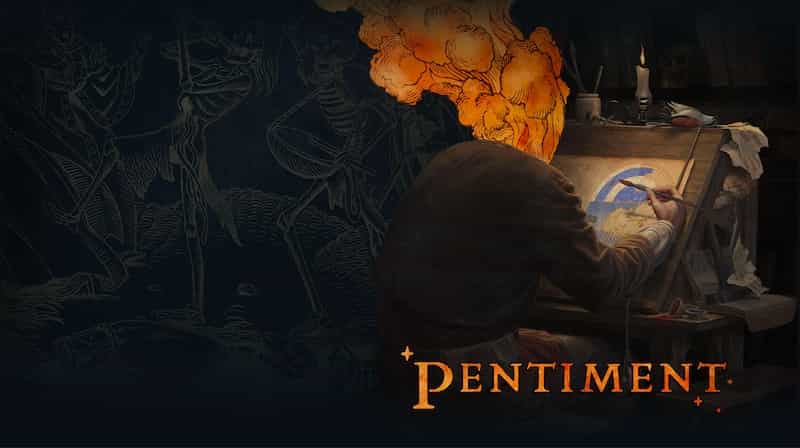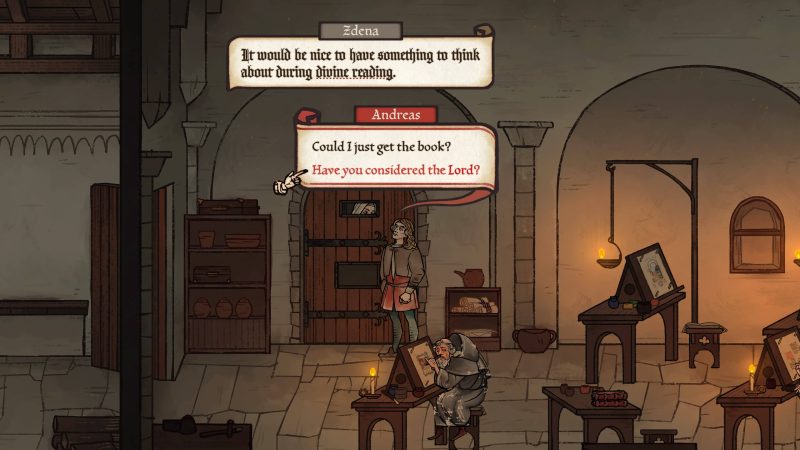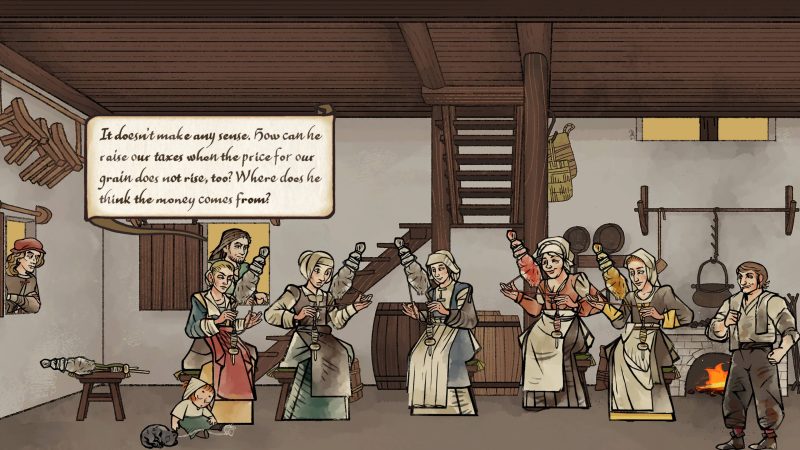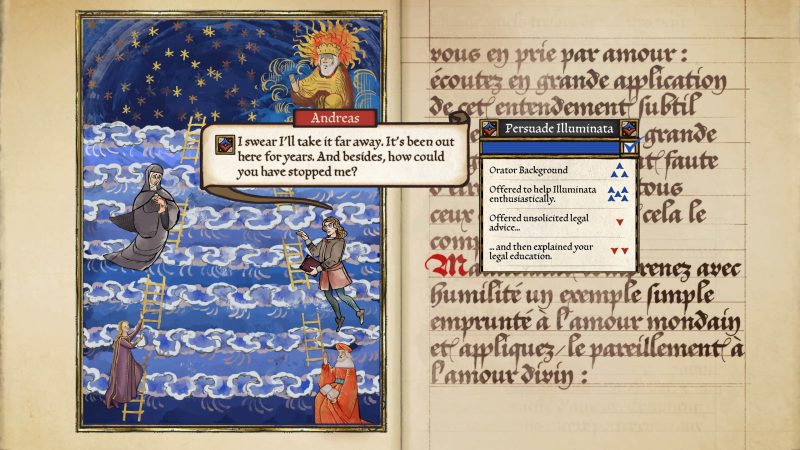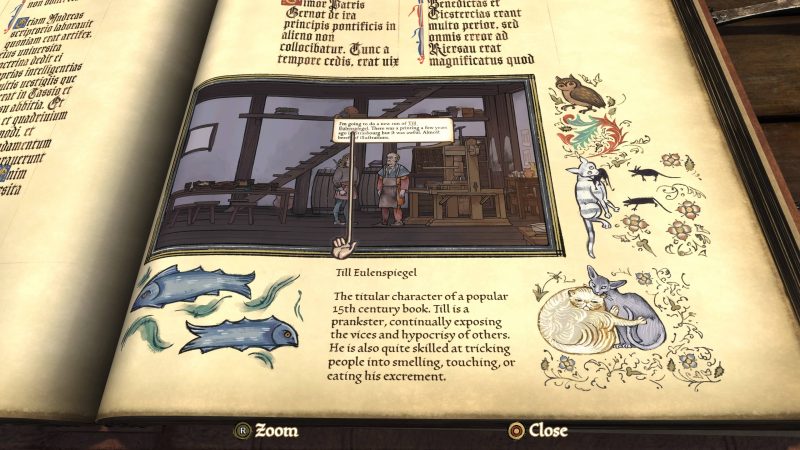Pentiment PS5 Review – Whenever a game pops up made by Obsidian, I simply have to grab it. I don’t even enjoy Fallout that much, but New Vegas showed me how it can succeed. However, unlike New Vegas, Pentiment delivers a nearly flawless title not just in terms of storytelling but refined, highly accessible gameplay.
Pentiment Review (PS5) – Turning Literal Art Into Gaming Art
Pentiment takes place during the 1500s, when Martin Luther preached against the hypocrisy in the Catholic Church. Andreas Maler is a traveling artist who takes on a commission in a small abbey near Tassing while also working on his own masterpiece. In the midst of all this, a murder mystery unfolds as an effect of the discourse caused by the Abbey’s taxation on the peasants.
Above all else, the first thing you notice about Pentiment (even before the quality of the writing) is the visual aesthetic. It serves as a combination of what you find on painted murals as well as stained glass windows in churches and cathedrals. The game displays everyone and everything in a gorgeous two-dimensional world.
Pentiment features no spoken word. Instead, it delivers everything like a novel. Everyone has a different type face used when they speak, and the artistry in their calligraphy reflects that person’s social status as well as education level. This also serves as a steady reminder of how socially divided classes were. The more educated were at the top while the least were at the bottom. A great touch in this aspect is how Pentiment delivers generational growth.
As the story progresses, so does the beginning of and accessibility to printed word. In this, more and more people have access to reading material, with each generation getting more educated than the last. It’s important to say that Pentiment offers an easy to read text option. If possible, though, I highly recommend using the intended text. The artistry plays into the themes too well to intentionally disregard.
Art In Motion
The presentation in Pentiment looks very different from previous titles, but the writing more than identifies this as an Obsidian game. There’s snark, drama, intimacy, charm, and wit all in spades throughout the entire game. The narrative strings together a cunning mystery made even more personal through the integrity of each character’s writing.
The narrative has several outcomes as well, with each outcome dependent on the findings you unearth in your investigations. If you miss certain interactions, you lose key information to make determinations. If you aren’t careful, you can unintentionally convict the wrong person. The true weight of these results carry through the rest of the game, affecting how the town and its citizens carry on their lives and even how their children end up living down the line.
Gathering this information isn’t as simple as finding the right person either. In each conversation, you decide how to approach it. If you don’t know the person and say the wrong things, you won’t get the response you want. These accumulate into skill checks that show you the results of past choices leading to that check. The result shows right away if you pass or fail and where you chose correctly or incorrectly. Like everything else, Pentiment doesn’t tell you much when it comes to the controls. So, when this first pops up, it serves as more than a skill check. It shows you where your morals are and how you treat people. It gives you pause, not just because it details your behavior but because it shows you a system that had been there from the start without you realizing it.
If you ever get lost, consult your journal. Andreas takes impeccable notes on conversations and goings-on and even categorizes them by family, clergy, office, etc. This journal comes with a complete map of the region, breaking it down from the town itself to the countryside to the abbey.
The map proves crucial, especially early on. That comes down to the two-dimensional nature of the game itself. When leaving areas, you go up, down, or diagonally out of a linear path. At least for me, the transition between areas don’t share common landmarks, so finding the right path between locations challenged me at first. Once I got it memorized, I had a much easier time. Thankfully, each new direction you take includes a label.
The only aspect of gameplay that can prove frustrating comes from this. Many times, different exits appear near enough to each other that you need to fidget around to prompt the exit you want. While these only occur in a handful of places, you return to those places rather often. Then there are diagonal pathways. Getting proper positioning may take a try or two. With both of these issues, once you acclimate to the limitations and anticipate what you need to do, you don’t experience many problems after that. As much as it hurts my heart to say anything negative about this game, it needs to be said.
One of the coolest features Pentiment offers is an active glossary you can use on the fly. When a name or word shows up underlined, hit the Touch Pad and a definition or description appears. Since this story finds itself in the middle of a transitional period for both Christianity and printed language, including the context along the way benefits the entire experience. To boot, this feature also helps you keep track of people directly involved with the story, adding a nice reminder feature without compromising the story or writing with frivolous recollections.
In fact, nothing about Pentiment undermines your intelligence. The controls are simple and universal enough that the game feels comfortable that you’ll figure it out on your own. The game does give you a hand in two ways that makes sense. The first comes when you load back into the game. Sometimes, if your journal doesn’t indicate something concrete for you to do, Andreas says things like “I need to eat with someone” to help you. Things like this don’t always happen, though, leaving you to determine your next steps.
The other assistance comes with mini-games, but these still break it down to button presses at certain times. This makes sense to the narrative because Andreas learns that skill at the same time you do, so the game still sticks to its standards while still helping you here.
Pentiment Excels In Both Style And Story
Pentiment is a passion project from top to bottom. Obsidian flexes its narrative muscles once again to deliver a masterclass in storytelling, this time in the 16th Century. The visual style will age like a renowned vintage, and the writing will stay relevant for generations. Anyone who enjoys historical fiction or just loves stellar writing, Pentiment is a must-play among must-plays.
Pentiment is now available for PS5 & PS4.
Review code kindly provided by publisher.
